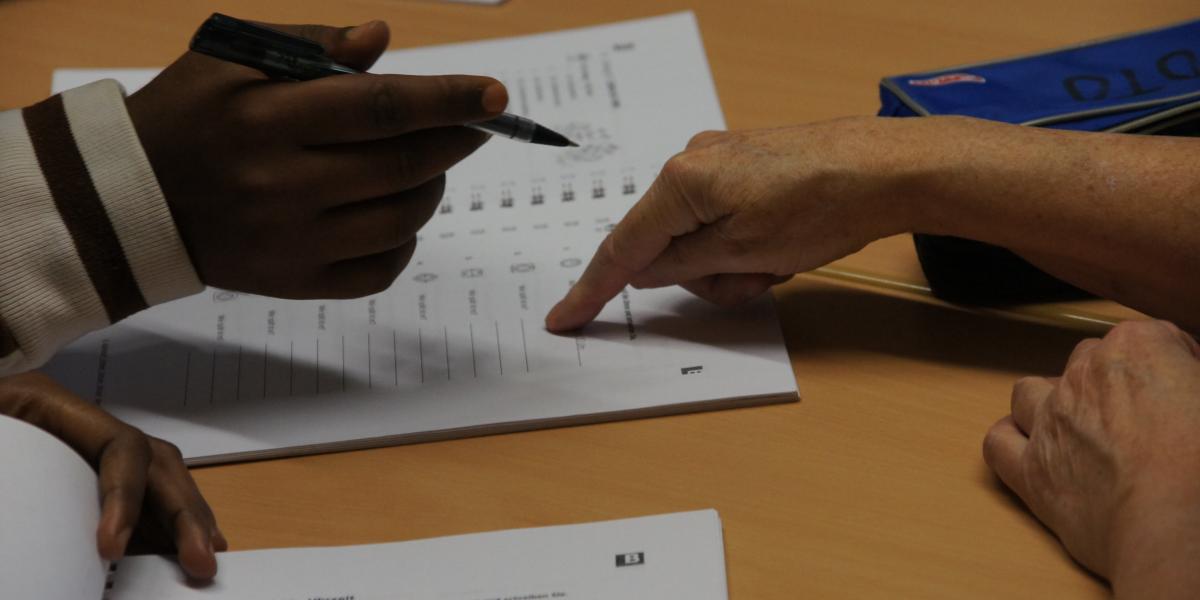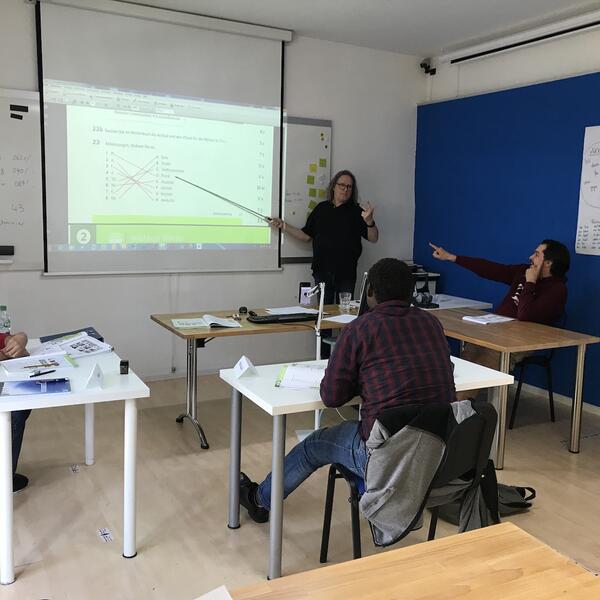
The German asylum procedure
1. Arrival and registration
You arrive in Germany. Ask for asylum directly at a government agency. You will then be taken to a shelter for asylum seekers. There it will be decided whether you have to be transferred to another federal state. If you have a family in Germany, you must say so directly. Sometimes you can then come to the first admissions office near your family. You will be registered at the first reception office. Fingerprints and photos of you will be taken.
You will receive a proof of arrival. It is like an identity document with your name and picture on it.
2. Appying for asylum
You must personally apply for asylum at the Federal Office for Migration and Refugees (BAMF). Afterwards you will receive a temporary residence permit (a green ID). If you were not registered at the reception center, your fingerprints will be taken and passport photos will be taken of you now.
3. Dublin procedure
BAMF verifies whether Germany is responsible for your asylum procedure. In some cases, this will happen during a separate interview. In other cases, this will be verified during the usual interview about your reasons for asylum. The aim is to conduct only one asylum procedure per person in Europe. During this procedure you will be asked about your travel route (refugee route) and if you were registered or already applied for asylum in another European country. At this point, you must state why your asylum procedure must be conducted in Germany, if you can. Reasons, for example, can be relatives living in Germany or human rights violations in another European country. If Germany is not responsible for your asylum procedure, you will receive a Dublin decision. With this decision your application for asylum is rejected as inadmissible and you will be deported to the European country that is responsible for you. You can, however, take legal action against the Dublin decision.
4. Your interview
The interview is very important for the decision as to whether you can stay in Germany or not. Ahead of the interview, you should consult a lawyer or an advice center for refugees. You will get help at the advice center without having to pay for it. You can find the addresses here: Link Arrival_Find help_Advice center. Sometimes, the interview will be shortly after you applied for asylum. It may also happen that you have to wait a few months. During the interview you should have the chance to talk about all important points. The focus of the interview is on the following questions: What happened in your home country? Why did you come to Germany? Why are you afraid of returning to your home country? It is important to know whether you have been persecuted in your home country. That is the case if you have to fear for your health or life. Another reason for a positive notice can be civil war in your home country. You must mention that you would not survive in your home country because of a disease or other problems (resulting in a deportation ban). You must describe everything in detail. Then you will have better chances of being believed. A written record will be made of the interview. Everything you say will be written down in the record. At the end of the interview, you will have the chance to have the record translated back into your mother tongue.
4.1 Your rights
- You can request to be interviewed by a man or woman. (Maybe it is difficult for you to talk about certain details in front of a man or a woman). The same applies for the BAMF interpreter. You can also request a man or a woman as interpreter.
- You may bring a person to the interview who speaks your language. With the help of that person you can check the translations of the BAMF interpreter.
- You may bring a person you trust (like a friend) with you to the interview. The name of the friend must be given to BAMF before the interview takes place.
- The interpreter from BAMF is only allowed to interpret what you say. You must speak up if you cannot understand the interpreter or you think that his or her translations are incorrect. It is possible to replace the interpreter.
- At the end of the interview you can correct the record. If something is wrong, you can correct it. If something you said is not in the record, you can add that.
4.2 Your obligations
You must come to the interview in person. If you are sick, you must inform BAMF and present a medical certificate. You must talk about everything during the interview. You are not allowed to add anything new later. If you have written evidence (documents), you must present them at the interview.
5. The decision
5.1 Rejection
- Simple rejection: the application for asylum is rejected because it is unfounded.
- Rejection of the asylum application because it is obviously unfounded: BAMF considers your interview statements to be totally implausible or you are coming from a safe country of origin.
- Rejection on grounds of the inadmissibility of the asylum application: Germany is not responsible for your asylum procedure (example: Dublin procedure).
Please always read your notice carefully and ask your adviser or your contact person if you have any questions about them.
5.2 Recognition
Your application for asylum is approved. This means that you will get protection status in Germany or a deportation ban. With this decision, you can apply for a residence permit (Identity Card, "Ausweis") with the immigration office.
6. Legal protection
6.1 Advice on legal remedies
The notice which you have received from BAMF includes advice on legal remedies. With this notice, you will find out where you can take legal action (which court is responsible for your action) and how much time you have to do this (deadline for filing suit).
6.2 Simple rejection
The action has to be received at the relevant administrative court within the next two weeks after the notice of BAMF has been delivered to you. This action has a suspensive effect. This means that you will not be deported before the court has made its decision.
6.3 Rejection of the asylum application because it is obviously unfounded or inadmissible
The action must be filed at court within one week. This action does not have any suspensive effect. Therefore, you have to file not only the legal action, but also an emergency application to the court. If the emergency application is turned down, you can be deported, even if the court has not ruled yet on your legal action.



